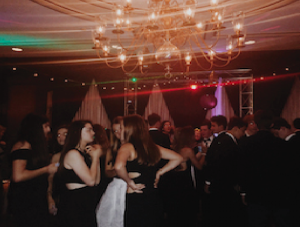Pia Singh ’19, Amanda Turner ’19: The Sweet Sixteen is a tradition that has persisted since the mid 20th century and embodies the idea of “coming of age”, but the popularity of this long lasting tradition may be on the decline. Dr. Everett Dulit, director of adolescent psychiatry at New York Hospital, wrote in a New York Times article, “Sweet Sixteen: A Rite that Persists,” that “The Sweet Sixteen is essentially a social ritual. Unlike a bar mitzvah, for example, which derives from primitive rites de passage in that it marks the onset of puberty, the Sweet Sixteen is primarily social in meaning, more like a debutante ball. A party for young females, it probably originated as a way of introducing the girl to the task of being a hostess, to the acquisition of social skills.” She continued to explain that Sweet Sixteens have been on a steady decline due to “Counterculture would have rejected it: Rock music, acid—the things the counterculture people were into—are sharp and biting, and they clash with the idea or sweetness.” Regarding the subsequent rise of these parties, “If Sweet Sixteens are coming back, it indicates a resurgence of interest in things more familiar and traditional, things which are considered ‘nice.’”

This May, Camilla Stapleton ‘19 hosted what is considered the classic sense of the Sweet Sixteen. “I decided to host a sweet 16 because I’ve wanted one since I was a little girl and sixteen has always been a big age for me. Coming of age movies emphasized the age sixteen and seventeen so when my mom exposed them to me at a young age, I knew I wanted one.” She continued to explain that “I think it’s a great way to bring a big group of my classmates together to have a good time at a setting outside of school.” Stapleton also elaborated that she had some concerns about having a Sweet Sixteen. She said that she was “concerned about people feeling left out by a lack of invitation and I really wanted to make sure everyone felt included, which is why I invited my entire class and my closest friends outside of EA as well.” While Stapleton loves the idea of an extravagant Sweet Sixteen and the culture associated with it, she said that “I do think the popularity [of Sweet Sixteens] has declined, more so because of the immense amount of preparation and planning that goes into throwing a big party. Sixteen is still regarded as an important age, but how you choose to celebrate it varies between each person.”
While Sweet Sixteens are a great way to bring people together to have an enjoyable night, students have expressed concerns regarding the purpose, necessity and extravaganza associated with hosting one. EA does have a history of extravagant parties, including Hart Callahan ’07 who was featured on MTV;s My Stupid Sweet Sixteen for the absurd amount of money thrown at the party. At Episcopal, the amount of sweet sixteen parties have declined in the past few years, and when a student decides to host a huge party it may seem out of place and forgotten.
Hope Biddle ‘19 says that she thinks “Sweet Sixteen parties are not that popular anymore, in my opinion, because of the stereotype that they have to be grand and impressive. The social pressure of hosting an entertaining party and selective invitations get in the way of simply trying to have a fun time without all the extra layers. Parties tend to be more low-key and are hosted within certain cliques rather than a huge party thrown for the entire grade.” They can still be simple and you can have a good time. I think that they can be so unnecessarily expensive when they don’t need to be, especially when a reason some people (all schools in general) host it is for the transparent purpose of showing off wealth or grandeur to your peers.”
Alyssa Sheffy ‘19 looks at the tradition with a more light hearted view, and opinionated her idea of the purpose of a Sweet Sixteen. “I think Sweet Sixteens are meant to be a fun way to bring people together to celebrate a milestone in somebody’s life and I think this can be done in a variety of different ways, whether it be a big party or a dinner with a few friends.”
Dulit’s article expressed more psychological reasons behind Sweet Sixteen culture, “Like so much at the high school level, activity on the Sweet Sixteen circuit is often governed by a strict set of social mores, tacitly agreed upon by the pacesetters and adhered to until a new trend comes along.” His thoughts support the idea of currently changing interests and social trends in high school that may disagree with the debutante ball style of a sweet sixteen and its association with being bratty or spoiled, even though our generation can be considered as the materialistic millennium. Social consequences of hosting a grand party may insinuate stereotypes of the host that one may not want.
Trends arrive in great fashion, but they can meet their end if society changes faster than the trend’s ability to adapt. This may be an age where today’s teens have outgrown certain traditions such as the Sweet Sixteen, or perhaps it is just another trend making its departure as a result of a changing social atmosphere and personal/societal preference.